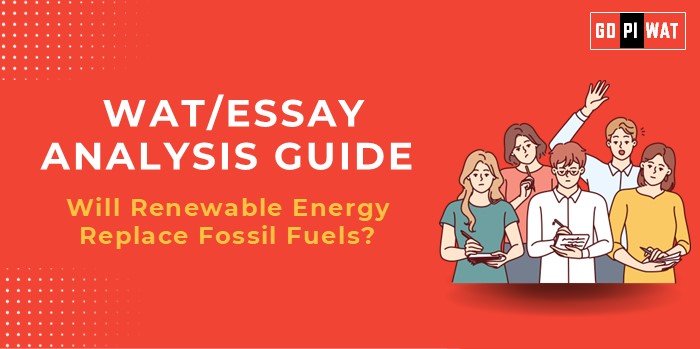📋 WAT/Essay Analysis Guide: Will Renewable Energy Replace Fossil Fuels?
🌐 Understanding the Topic’s Importance
This essay connects directly with sustainability, a critical theme for business schools worldwide. Addressing this topic highlights an understanding of economic, technological, and policy dimensions, essential for future managers in industries influenced by energy transitions.
📝 Effective Planning and Writing
- Time Allocation:
- Planning: 5 minutes (organize points and data).
- Writing: 20 minutes (structured paragraphs).
- Review: 5 minutes (check for logical flow and errors).
- Preparation Tips:
- Gather credible data.
- Identify stakeholder roles.
- Outline the global and national impacts of renewable energy adoption.
📖 Structuring the Essay
- Introduction Techniques:
- Contrast: “Renewable energy is surging globally, accounting for nearly 30% of electricity generation in 2023. Yet, fossil fuels still dominate, contributing to over 80% of primary energy use. This paradox underpins the global energy debate.”
- Solution-Based: “Advancements in green hydrogen and battery storage have made a renewable-only energy system feasible, but overcoming economic and infrastructural challenges is vital.”
- Body Paragraphs:
- Achievements:
- Highlight key successes like Norway’s near-total reliance on renewables, India’s rapid solar expansion, and the global fall in renewable energy costs.
- Example: “In 2023, solar energy costs dropped by 89% compared to 2010, making it more affordable than fossil fuels in many regions.”
- Challenges:
- Discuss the intermittency of renewables, the dependence of many economies on fossil fuel exports, and the need for massive investments in infrastructure.
- Example: “Countries like Saudi Arabia face the dual challenge of reducing emissions while diversifying economies reliant on fossil fuel revenues.”
- Future Outlook:
- Emphasize the potential of green hydrogen, international collaborations like the EU’s Green Deal, and innovation in energy storage systems.
- Example: “The EU’s Green Deal targets a 55% reduction in greenhouse gas emissions by 2030, setting an ambitious benchmark for global efforts.”
- Achievements:
💡 Concluding Effectively
Balanced Perspective: “The global energy transition is underway, but complete replacement of fossil fuels will require addressing technical, economic, and geopolitical challenges. Collaborative efforts between nations and industries will be pivotal for success.”
Future-Oriented: “Renewable energy offers a path to a sustainable future. However, the speed and effectiveness of this transition depend on technological breakthroughs, equitable policies, and substantial investments in energy infrastructure.”
📄 Sample Short Essays
- Balanced Perspective: “While renewable energy is steadily growing, fossil fuels remain entrenched in global energy systems due to economic and infrastructural challenges. Countries like Norway showcase what is possible, but a balanced transition plan is needed to ensure inclusivity and resilience.”
- Solution-Oriented: “Advancements in battery storage and green hydrogen technology have positioned renewables as viable replacements for fossil fuels. Policymakers must prioritize investments in these areas to accelerate the transition and achieve global sustainability goals.”
- Global Comparison: “Norway’s success in renewable energy contrasts sharply with coal-dependent nations like India. Tailored approaches are essential for each country to address its unique challenges while working towards a fossil-free energy future.”
✨ Recommendations for Sustainable Progress
- Investment in Research and Development: Prioritize funding for advanced storage solutions and next-generation renewable technologies.
- International Collaboration: Strengthen partnerships like the International Renewable Energy Agency (IRENA) to share best practices and resources.
- Policy and Incentive Reforms: Offer subsidies for renewable energy adoption and impose carbon taxes to disincentivize fossil fuel usage.
📚 Additional Resources for Insights
- Reports: IEA’s Renewable Energy Outlook 2024, IRENA’s Renewable Energy Statistics 2024.
- Case Studies: Germany’s Energiewende program, the EU Green Deal.
- Expert Quotes: Incorporate insights from leaders like Fatih Birol (IEA) and global energy analysts.


